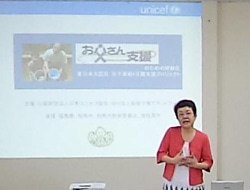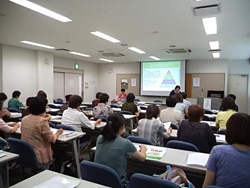



[21 August 2013, SOMA/MINAMISOMA, JAPAN]
 |
| © Japan Committee for UNICEF |
| Niiza Child Care Support Network representatives Junko Sakamoto and Ikuko Sano explained about challenges unique to Fukushima, in addition to problems faced by prefectures across Japan and the current situation of those challenges. In their lectures they introduced tools for providing everyday assistance, making for workshops rich with practical advice. |
As people in the affected areas work to reconstruct their lives, overwork and child-rearing complications continue to impose an increasing level of burden. Despite the various forms of assistance available, there is little attention being focused on the problems faced specifically by fathers. In response to this situation, two years ago the Japan Committee for UNICEF (JCU) partnered with NPO Niiza Child Care Support Network and local governments in launching the Single-Father Household and Fathering Assistance Project. In Fukushima, the prefecture's first fathering assistance training workshops were held in June 2013 for individuals active in the fields of education and welfare. Again, on 21 August, similar training workshops on fathering assistance were expanded to Soma and Minimisoma Cities.
For this installation of the training, JCU jointly hosted a morning workshop with the Soma City Health and Welfare Division at the City Welfare Center. The morning session was attended by 26 child social workers, nursery staff, school counselors, educational consultants and others. Next, JCU partnered with Haramachi Club, an NPO active in Minamisoma, to hold another workshop in the afternoon at the city's Welfare Center. The afternoon session was attended by 22 participants, including Haramachi Club and family support center staff, nursery staff and kindergarten teachers.
Junko Sakamoto and Ikuko Sano were the two Niiza Child Care Support Network staff leading the workshops. They explained about the current situation and challenges faced by fathering assistance in Japan, as well as the special obstacles unique to the Great East Japan Earthquake and Fukushima. The two also discussed the emergence of single-father households and how fathers were suddenly forced to assume a greater child-rearing role as a result of the disaster. This, they assert, is the tip of the iceberg for Japan, a country where father participation in child-rearing has traditionally been low. They stressed the need to support fathers, amidst a situation where heightened levels of "reconstruction stress" have led to fathers' neglect of their children and abuse, and in Fukushima a situation where many fathers live alone.
Akiko Watabe, a Soma City child social worker who attended the workshop, voiced that, "The workshop was very helpful as they provided rich data about the current status of child-rearing by fathers, and they covered a lot of information. In the future, I hope that in addition to child social workers, other local social workers also participate in this valuable training." President Emoto of the Haramachi Club, who jointly hosted the workshops and actually participated in the training, emphasized the significance of the training: "Assistance providers tend to be the only audience at these types of training workshops, but by holding the workshops locally we were able to attract participation from a wide range of people, also contributing to cross-generational exchange."
 |
| © Japan Committee for UNICEF |
| More than 50 specialists participated from Soma and Miniamisoma. Norio Saito, Assistant Manager of Soma's Social Welfare Section (Health and Welfare Division), comments, "Fathers rarely come to the city hall for consultations, so it is very important that everyone here—the very people involved in these activities in the community—support them." |
Norio Saito, Assistant Manager of Soma's Social Welfare Section (Health and Welfare Division), commented, "In Soma, 17 households lost a mother to the disaster, creating single-father homes. Fathers rarely come to city hall for consultations, so it is very important that everyone here—the very people involved in these activities in the community—support them." Sumiko Ogura, the Assistant Manager of Minamisoma's Gender Equality and Children Section (Health and Welfare Division), talked about the role of fathering assistance and local experts, and the importance and need for efforts like these workshops that aim at improving the ability for those individuals to respond to local needs: "In Minamisoma, roughly 60% of primary and junior high school students, and 40% of preschool-age children, have returned to school compared to enrolment numbers before the disaster. Slowly but surely the numbers are rising. Efforts addressing single-father households and fathering assistance are topics that are hard to deal with by the city administration, so I am very grateful for this type of training workshop."
The participants in the training workshops held in Soma and Minamisoma actively support the community's fathers using the tools taught in the training as well as the subsidies discussed in the training. Yoshiyuki Kondo, a child caretaker who operates a preschool in Minamisoma and who has spearheaded the Strong Fathers Project since the disaster, commented: "The training workshops were rich with useful information. I intend to plan assistance activities that take advantage the fathering assistance subsidies."
The Japan Committee for UNICEF will continue to hold trainings in Fukushima for individuals involved in child-rearing assistance and child education. In Iwate and Miyagi, we will also hold symposia themed on fathering assistance for specialists and the general public. More than 400 individuals have participated in the fathering assistance training workshops held in Miyagi, Iwate and Fukushima, and JCU will continue to assist participants in their efforts to support fathers in need.